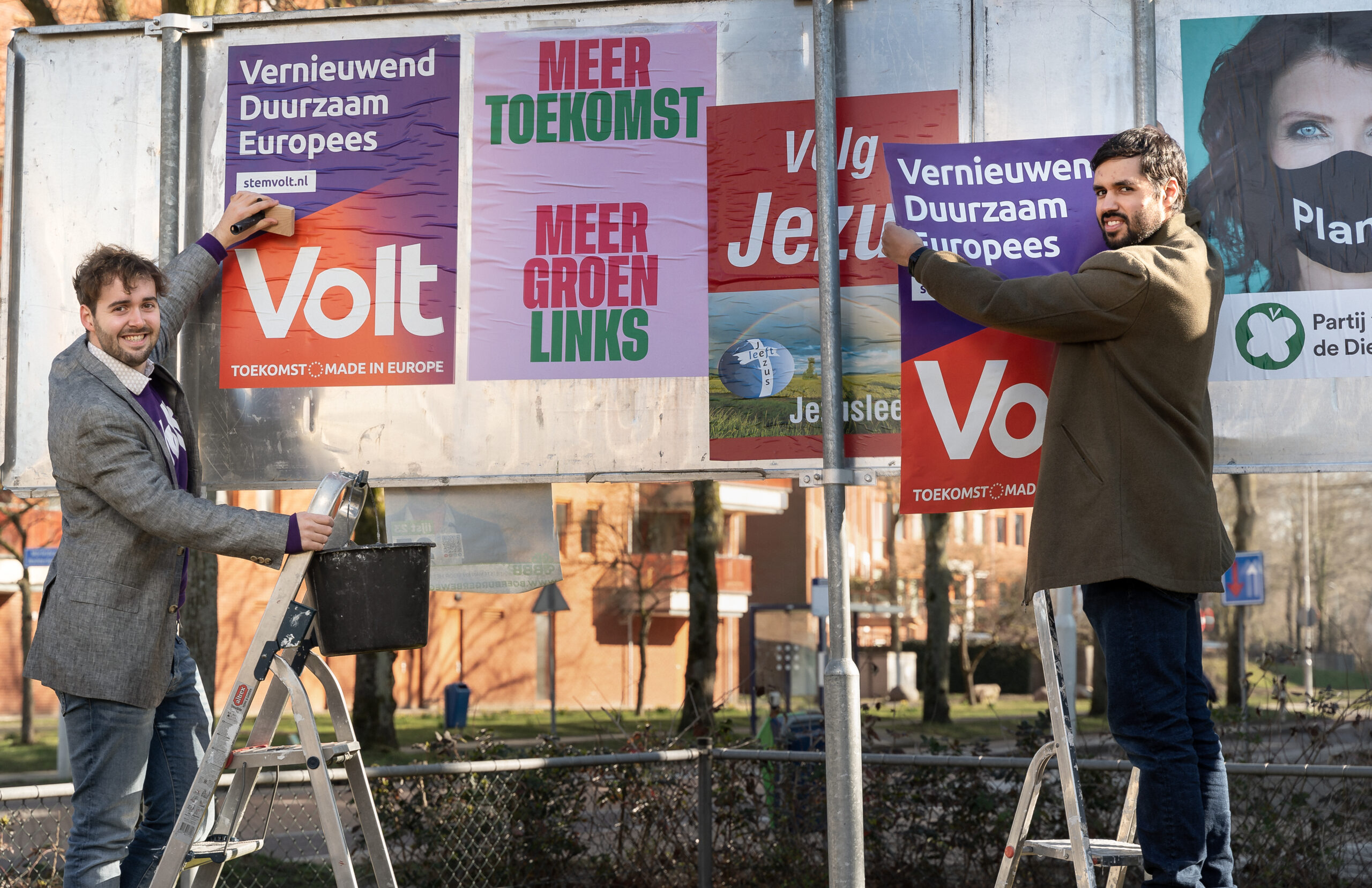Jeroen Koendjbiharie, a postdoc at the Laboratory for Microbiology, and Fons Janssen, who will graduate soon with an MSc in Biotechnology, are both on the ballot paper as candidates for Volt, a new party in the parliamentary elections. Resource asked them about their motives and the relationship between science and politics.
Why politics?
Fons: ‘I was politically active during my student career. I helped revive the student union and I used to be a member of the Young Democrats. But that didn’t suit me at all, I wanted immediate action. I am about to graduate as a biotechnologist and I’ve learned a lot about agriculture, the climate and the environment. But I see that this kind of knowledge is rarely applied in politics. I joined Volt two years ago. After that it was a small step to run for election.’
Jeroen: ‘As a scientist I am curious by nature and I want to make a meaningful contribution to society. Science is underrepresented in politics, whereas a lot of the big issues are typically scientific topics such as the nitrogen problem climate change, and cyber security. I think we need more people with scientific expertise in parliament, and I want to set a good example myself.’
And why Volt?
Jeroen: ‘Volt is the only pan-European party, with a joint programme for EU countries. Problems like the climate and migration go beyond national borders. And take corporate income tax, for example. That is a race to the bottom, with the Netherlands attracting companies with its low tax rates.
I think WUR should make itself heard, and in politics too
The dot on the horizon is a fully parliamentary democracy in the EU, rather than the consensus models we have now, which lead to slow and often weak decision-making. That doesn’t mean you move everything to Brussels, it means that what gets decided at the European level is decided democratically.’
Fons: ‘The great thing about Volt is that we work across borders. We do a lot with our fellow party members in Germany and Belgium. In 2015, I was visiting a friend in Paris when the terrorist attack happened at the Bataclan. That opened my eyes to the fact that we in Europe share a common destiny. So I think the existing national parties should merge to form European parties.’
What do you intend to stand for?
Fons: ‘I want to focus my efforts on agriculture, climate policy and the border regions. The Hague favours the big cities in the west of the country too much. Less is spent on schools in Limburg than in Rotterdam, and the public transport system is not organized fairly either. Limburg is marginalized as a border region, whereas from a European perspective, Limburg is at the heart of the Meuse-Rhine region. We in the Netherlands are far too preoccupied with our little patch of land. A European party can propose solutions that national parties wouldn’t come up with. Take nitrogen: 35 per cent of nitrogen deposition in the Netherlands comes from over the border, and not just from farmers but also from the burning of fossil fuels. Looking at CO2 emissions, the Dutch steelworks are major emitters, but they also provide the material for wind turbine production in Denmark. Biodiversity doesn’t observe borders, either. For nature policy, the Netherlands does have a vision of a European network, but so far it’s just a paper tiger.’
Jeroen: ‘For me, sustainability and democratic reform are important points. I see more and more protest voting for populist parties. People think, rightly or wrongly, that everything gets decided by a small clique in The Hague. I would like us to try a different model, in which many more decisions are taken locally and bottom-up. Citizen forums, for example, with seats allocated by lottery and in which party politics and political careers don’t play a role. And if there is funding to develop an area, let local people decide how best to use it, rather than the municipal council. You increase popular support for decisions that way. People feel they are taken seriously if they are given responsibility.’
Scientists in politics, is that a good idea?
Jeroen: ‘Diversity is very important in politics, and that’s about having different personalities, knowledge and skills involved as well. As I said, parliament could do with more scientists. People who not only look critically at the legal side of things but can also explain why something like biodiversity is so important.
We in the Netherlands are too preoccupied with our little patch of land
At present the scientific advisors are often in the background. If you ask me, that should be reversed: politicians with a range of scientific knowledge at their fingertips, who seek advice on the legal aspects.’
Fons: ‘Science is more important than ever, especially in these times of misinformation and disinformation. Scientists must be proactive on this point, otherwise you can too easily be swept aside by the loudmouths. We explicitly mention WUR in our manifesto, because a lot of important political themes are related to WUR’s areas of expertise. Take gene technology for making our crops climate-proof, for example – that is something WUR argues for, but which politicians take very little notice of. I think WUR should make itself heard, and in politics too. On subjects like CRISPR-Cas, for example, or in-vitro meat. On the latter, the US and Singapore are ahead of the field now, whereas we have the best researchers on it here in the Netherlands.’

 Fons Janssen (left) and Jeroen Koendjbiharie. Photo: Sven Menschel
Fons Janssen (left) and Jeroen Koendjbiharie. Photo: Sven Menschel